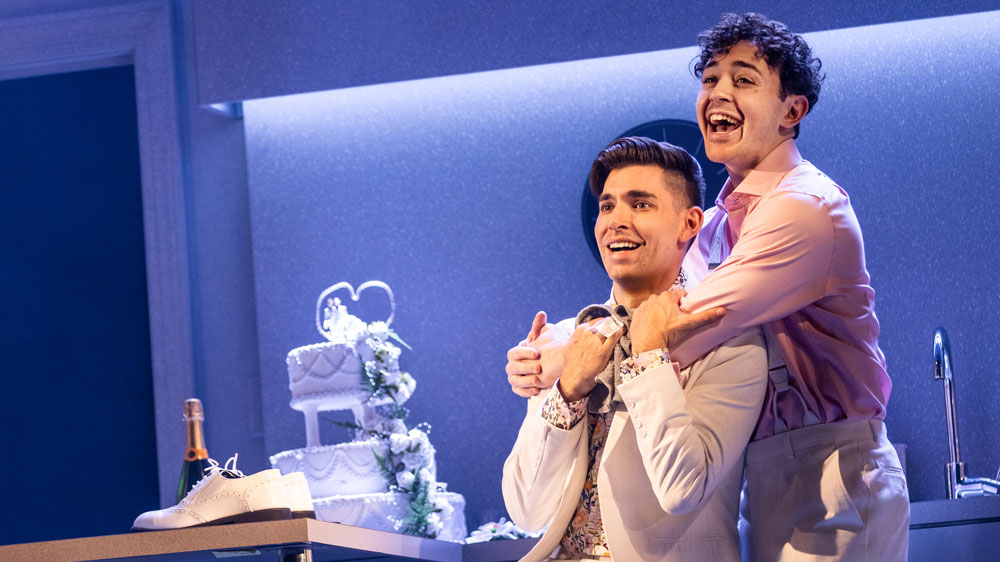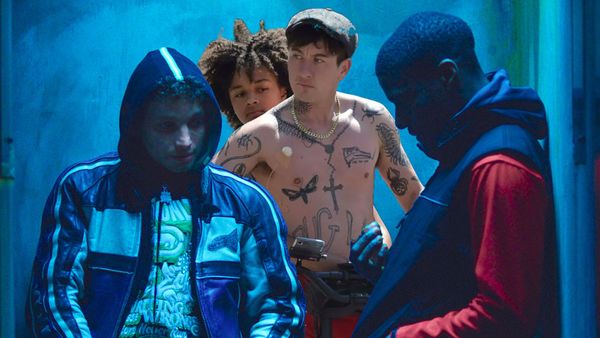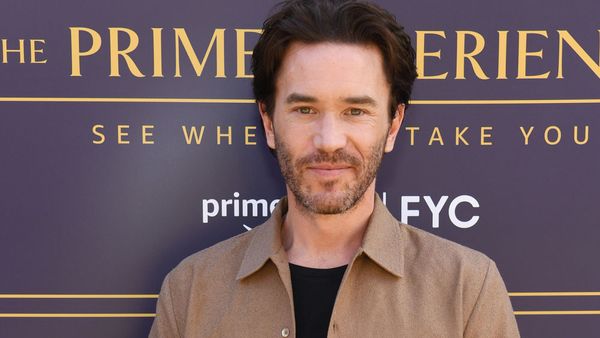July 28, 2016
Non-Binary, All-Encompassing Fun :: Mal Malme on 'The T Party'
Kilian Melloy READ TIME: 11 MIN.
It's been a while since EDGE chatted with Mal Malme, a busy Boston actor currently appearing in Company One's production of Natsu Onoda Power's theater work "The T Party." Once EDGE has Mal on the phone, though, the conversation flows easily.
"You know Becca Lewis, I'm sure, the local actor?" Mal says. "She and I wrote a show for kids about gender called 'The Pineapple Project.' We've been touring that around for the past six months. We hope to be touring it more next year, too. We just finished a tour of some of the branches of the Boston Public Library, which is really fun."
Having attended a performance of "The T Party," EDGE also has an idea of "The Pineapple Project." There's a scene in "The T Party" in which Mal appears in the role of Mal's self, teaching a group of second graders about gender identity. The actors wear different representations of fruits on their heads like party hats -- a banana, a peach, a pineapple -- that stand in for their gender identities. The lesson is that not every little "boy" (as outwardly seen and defined purely by physiology) feels male, and not every little "girl" (as defined by the same criteria) embraces a female identity. Physiological plumbing itself doesn't just come in two varieties: As Mal recounts to the class, it's a statistical fact that there are a certain number of live births in which a child's genitalia is "ambiguous," and doesn't fit either the typical "male" or "female" model. Such children as regarded as "intersex," and assigned gender at birth. But as they grow older, and begin to express who they are on the inside, "boys" sometimes turn out to be girls, and vice-versa.
This is true even of children born with perfectly normal-appearing male and female parts. The thing is -- again, this is a statistical fact -- there are some children whose inner sense of who they are, and whose very deep psychological identity, does not match their physical equipment.
It's not always as simple as a "boy" being a girl, or a "tomboy" being more boy and less "tom." People don't all exist on the same binary male/female, either/or continuum that has long been regarded as the norm. Nor is it all a matter of straight and gay, or even straight/gay/bi/asexual. Human gender and sexuality are far more nuanced and complicated than that.
So are pronouns. As Mal notes to the "kids" in the "class," Mal's own gener preference is not "he" or "she" or even "they," but "Mal."
Asked what Mal's been up to of late, Mal offers a quick rundown.
"In 2013 I was in 'Burning' at Boston Playwrights. Ginger Lazarus wrote that. That was about a former Army sergeant who let over 'Don't Ask, Don't Tell' and sexual abuse in the military. And then two years ago I did 'Turtles,' which was Boston Public Works, which was a newer theater company that was at the BCA... And then I've been working on 'The Pineapple Project,' and now this show. That's it in a nutshell.
"It's kind of cool that all my work right now is focused on the gender identity and expression movement, which is kind of big right now in terms of what is going on locally, for sure," Mal continues. "The show is happening at the perfect time."
In gay parlance... regular EDGE readers will probably know this, but let's allow for those who might not... a "T Party" is a dance party characterized by loud music and cocktails. (Sorry, there's no tea involved except maybe for Long Island Iced Tea.) Back in the days when it was illegal to serve gays alcohol and gay bars were surreptitiously run, "tea party" was code for a gay gathering.
But this particular "T Party" has more going on than shirtless dancing and a DJ spinning music that you can feel thudding in your chest cavity. For one thing, "The T Party" is described as "non-binary" -- you know, that male/female and gay/straight way of looking at the world mentioned above, that either/or digitalism that fits so uneasily into an analogue real world. "The T Party" ain't that.
So what is it? Mal gave eloquent voice to that very question.
"The show itself is wrapped in so many things. That's what I love about it, it's not all about one thing, it's about many things. It's sharing stories of people who are more complex than society kind of allows. As we all know, culture likes to label things and put people in boxes because that's just the way it's been for so long. I think there's a new movement of folks, including myself, who don't fit in those boxes, and want to start conversations about what it's like to live your own truth whether that fits in a box or not. 'Non-binary' is one of those, and I kind of identify with that; I also identify with 'gender non-conforming,' or 'gender queer,' whatever you want to call it. The words change all the time, but the feelings and the emotions inside don't really change, they just surface more because of moving into a society in which people are starting to speak out and connect with each other.
"I can only speak for me, and I don't necessarily identify as female or male, man or woman; those are just two things that society likes to put people in. I am my own thing. Kind of in-between those; another word for it is 'gender-fluid.' There are a lot of terms that people use and people pick which one they feels connects most with them.
"This play is a wonderful opportunity for people who may not be familiar with all the terms, or who may not be familiar with people who identify with those terms to experience how they walk in the world. These are some of the stories that come through in the play."
"The T Party" bears some thematic resemblance to another Natsu Onoda Power-written work, "Astro Boy," which Company One did a couple of seasons ago. There was a beautiful cartoon sheen over that play beneath which many things could be brought together under the guise of hanging out and having a good time with a cartoon character and his creator.
"Right, and that's kind of the flavor of this play as well," Mal said when EDGE mentioned the connection. "Natsu is incredibly skilled in writing an atmosphere that allows people to come into the experience of this play with the sense that it's a party, it's a celebration. Then, I think, people are more open to experiencing it -- they're not coming into it feeling like they have to defend who they are, or feel like they are being judged, or feeling like people are trying to ram points down their throats. This play has none of that. You come in, it's a '90s prom. There's music playing, everybody's dancing, and that's the concept: You come in to this fun feeling. Theater in itself is a wonderful vehicle for bringing people together, and build a community, and start a conversation."
Not only does the play begin with a turn on the dance floor... really, it could as easily be a typical T party as a prom night from twenty years ago... but it carries on with a free-form mix of song, sketches, and performance art. In one skit, a man and a woman text about his new dress, while she simultaneously checks her email, deletes spam, and cruises at a dating site. This is accomplished by two actors talking to each other as though their characters were in the same room, but they also undertake funny, symbolic actions -- like throwing a can of Spam into the trash -- that make it clear this is a theatrical take on a texting exchange. It's both verbally and visually funny.
That sense of open-ended play, and multiple meanings, persists throughout. Then, too, of course, there's the resemblance to the phrase "T Party" to both the historic Boston Tea Party and the contemporary political use of the phrase, which has been adopted by a, shall we say, vigorous branch of the Republicans.
"Yeah, yeah!" Mal enthuses. "There are jokes in the play about the new Tea Party, T-E-A, as well... Natsu considered changing the title of this play because of that historical Tea Party, and because here in Boston people might come in thinking, 'Wow, we're going to see some historical theater about how this country was born...' And then, 'Oh, no!' It's kind of hilarious, all the different things people [associate with the title]... I say I'm in this play called 'The T Party,' and I've had people say, 'Oh! Is it about this? Is it about that?' -- referencing both [the Boston Tea party and the current political movement]. And I say, 'Actually, no...' It's kind of fun.
EDGE, flummoxed in an attempt to formulate another question, finally has to ask: What pronouns do author Natsu Onoda Power prefer?
"She identifies with 'she,' 'her,' and 'hers,'" Mal supplies.
EDGE, with thanks and relief, proceeds to ask what it's like working with Power, who is directing her own work for the Company One production.
"Wow, it's been incredibly helpful, actually, because she can tell us about where the idea came from for the play, and all the iterations of the play," Mal replies excitedly. "I think this is the third production of the play. She [Power] teaches at Georgetown, so she had a first iteration with students. The second was a professional production, and I think this is the third.
"It's been updated with each production. As current events happen, those get incorporated into the context of the play. That's what she wants. She loves how things get changed. As we've worked on this production we've added our own spin to things, the cast itself and her, working together. And then also taking the pieces that she's created before, and working on those; and then we've created pieces together and added lines here and there as things unfolded, like when Orlando happened. We were like, 'We need to honor that in some way.' That got into the play.
"The law that was just passed a couple weeks ago that Governor Bakers signed [relating to] public accommodations for transgender people [is another example]. We incorporated a line about that. That's what keeps it fresh -- it's always evolving, it's always keeping up with what's going on and so it's not just theater. It's alive. If and when she does it again, it will change then, too. That's something that's great about working with her; she's just so open and encouraging and willing to experiment and use the people in the room with her to create to create pieces -- and bring the pieces that she's already created into a new space."
For some readers -- perhaps many readers -- the question of how to approach the topic of a stranger (or new acquaintance's) gender identity and pronoun preferences might be daunting. Is it even polite to ask?
"Really good question!" Mal says. "I think one of the things we do a lot in queer and gender groups that I wish was more out in the world [at large] is not to assume people's gender pronouns. For instance, whenever we were in rehearsal, whenever we have guests coming in to watch rehearsal or whatever, we'd go around the room and introduce ourselves and then give our preferred pronouns. I think it's important to never assume, based on someone's appearance, how they identify, what pronoun to use. It's better to ask before you assign something like that to somebody. I find that really helpful because some people in the cast use the pronounce 'they,' 'them,' and 'theirs,' and that's kind of new for a lot for people. Sometimes people slip up, and that's okay because we know it takes a while for people to digest. But making sure you ask before you just assign people a pronoun. That's a simple way to start.
"I think it's always good to ask, with everybody you meet," Mal goes on to add. "Like I say, we base so much on appearance across the board. Some people who identify as heterosexual or cis-gender may not be accustomed to being asked for their pronouns, but I always think it's better to say, 'Hi, my name is Mal, nice to meet you, can I ask you what pronoun you prefer?' Then you're putting it out there right off the bat.
"I know people appreciate that, especially the people in the queer and transgender community appreciate that little extra effort. Because then the onus is on them to correct you, which can sometimes be hard, depending on the context."
So, in other words, it's not unlike the experience of meeting someone in the foreign country. You might not speak the same language, but it shows good will to give it a try.
"Right, exactly," Mal laughs. "I've been to Paris, that there's definitely a difference between American tourists who [don't bother, and travelers who know at least to try.]"
"The T Party" continues through August 13 at the Boston Center for the Arts. for tickets and more information, please visit https://companyone.org
Kilian Melloy serves as EDGE Media Network's Associate Arts Editor and Staff Contributor. His professional memberships include the National Lesbian & Gay Journalists Association, the Boston Online Film Critics Association, The Gay and Lesbian Entertainment Critics Association, and the Boston Theater Critics Association's Elliot Norton Awards Committee.







